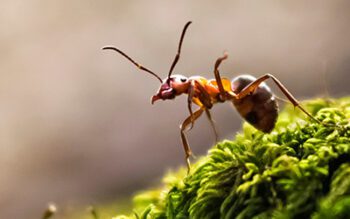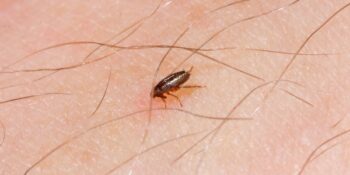For many Long Islanders, winter is an exciting time. Getting cozy on the couch with your family watching holiday movies while the snow falls outside can be enough to push household insects to the back of your mind. It’s actually a common misconception that household pests like ants, roaches, and spiders simply “die off” in the winter, leaving Long Island homeowners in a blissful, insect-free world for a few months.
How Do Insects Survive Winter?
In the winter, many pests will actually become more active indoors, because like us, they think it’s cold, too! Insects and other household pests like mice and rats have varying ways of surviving the coldness of winter…sometimes in the cracks, crevices, and corners of your home.
The Lowdown on Overwintering 
Overwintering is the process used by insects and other common Long Island pests in order to essentially “wait out” the winter season through methods such as hibernation and migration.
Unlike mammals, who are classified as endothermic, meaning they can generate their own heat internally, many insects are exothermic, which, you guessed it, means they rely on external sources to provide the heat they need to survive. Because of this, it’s likely you’ll see an increase in pest activity during the winter as they seek warm hiding places. Meanwhile, for the insects who are less mobile during the winter, you’ll very likely see a burst of pest activity in your home once temperatures rise and these critters are back on the move.
Here’s a breakdown of what some of the most commonly spotted household insects in Long Island homes are up to during the winter months.
Do Roaches Die in the Winter?
Roaches fall into the category of exothermic pests, meaning they’re not able to produce heat on their own and depend on the environmental conditions around them in order to be comfortable and mobile. Roaches in winter are opportunistic pests, and will often move indoors in search of warm-enough spaces like your basement or crawl space, while reproducing at a slower rate during the colder months.
Where Do Ants Go in the Winter?
Ants are almost synonymous with spring and summer, so it’s not surprising that many people believe they “die off” during the winter months. In actuality, ants, too are exothermic arthropods, so during winter, they will seek warm spots to hide, and residential homes make the perfect place to land—food, water, shelter, and warmth—what more could a little pest need? Because they tend to hide in hard-to-reach areas (ants are masters of hide-and-go-seek!), unless you’re often checking inside your walls or under your floorboards (we hope you’re not), you probably won’t even know they’re there. Again, once temperatures rise, ants will reemerge from their hiding spots in search of food. Because ants have specialized roles within their colonies, the workers will locate food, then alert the rest of their clan, leaving pheromone trails like breadcrumbs to guide the rest of their gang to the food source (inside your home, given the opportunity).
Where Do Spiders Go in the Winter?
Spiders, too, are exothermic arthropods, dependent on external warmth to get by during the winter. Different spider species cope with winter in different ways; some may create nest-like webs in dark, hidden areas like your chimney, while others may build cozy, insulated nest pods in your roofing or siding. Some will even hide out inside your crawl space, basement, closet, or pantry.
Interestingly enough, some species of spiders native to cold climates have been developing coping mechanisms for cold temperatures for centuries, and as their bodies sense dropping temperatures, they will start accumulating chemical compounds in their bloodstreams which work like antifreeze.
Rats and Mice in Winter
During the winter months, rodents like mice, rats, and other furry pests like raccoons and squirrels are on the move…to the inside of your home. Unlike the previously mentioned pests, these critters fall into the category of endothermic, meaning they’re able to generate their own heat internally, but if you think it’s cold outside, so do they! These pests will invade your house in order to find a warm hiding place to call home for the colder months, generally leaving behind costly damages, urine, and feces.
The Monarch Butterfly Migration
Unlike less favorable insects, the monarch butterfly is a beautiful insect with interesting winter behavior. Unlike other insects who overwinter, as mentioned above, monarch butterflies are unable to survive the cold winter temps on Long Island. Monarchs use environmental cues to determine when it’s time to travel south (as many as 3,000 miles!) to reach their warm winter homes.
Why You Need Winter Pest Control
Despite what you may have heard, winter pest control is a crucial part of keeping your home pest-free*. For complete year-round peace of mind, Suburban Exterminating offers annual pest protection plans to make sure you don’t have any surprises. To find your perfect yearly protection plan, click here.




